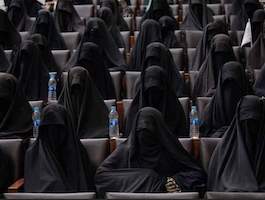As of August 23, 2024, the Taliban’s Supreme Leader has mandated that women in Afghanistan must cover their entire face and body, leaving no part visible, including hands, in public. This rule, which previously was a recommendation for wearing a black veil, has now been enforced as law.
Afghanistan’s Taliban leadership has recently enacted a stringent set of laws aimed at regulating moral conduct, particularly targeting women’s rights and public behavior. These laws, approved by the supreme leader Hibatullah Akhundzada, were formalized in a 114-page document detailing 35 articles, marking the first comprehensive declaration of vice and virtue laws since the Taliban regained control in 2021.
Here’s a detailed look at these new regulations:
- Women’s Public Appearance: The new laws mandate that women cover their faces and bodies completely when in public, emphasizing the use of face coverings to prevent any form of temptation or interaction that might be deemed inappropriate. This includes restrictions on clothing that could be considered revealing or attention-grabbing.
- Voice and Interaction: Women are now forbidden from raising their voices in public settings, which includes singing, reading aloud, or even speaking loudly. This extends to prohibitions against women looking at men who are not related to them, aiming to minimize any form of interaction that could be interpreted as immodest.
- Public Behavior and Media: The laws also touch on broader societal norms, banning the publication of images of living beings, which could significantly impact media and artistic expression in Afghanistan. Music, a long-standing cultural element, has been outlawed, alongside restrictions on solo female travel and mixed gatherings of unrelated men and women.
Afghan women suffer the most under Taliban's Sharia law. The regime has reverted to medieval cruelty and barbarism. "We will flog the women…we will stone them to death in public," declared Taliban supreme leader Haibatullah Akhundzada. pic.twitter.com/5ZEIQ48xaq
— Habib Khan (@HabibKhanT) August 23, 2024
- Enforcement and Implications: These laws are enforced by the Ministry for the Propagation of Virtue and the Prevention of Vice, which has the authority to issue warnings, arrests, or other forms of punishment for non-compliance. This enforcement mechanism has raised concerns about increased surveillance and control over personal freedoms.
- Global Reaction and Human Rights Concerns: The international community, including UN officials and human rights organizations, has expressed deep concern over these laws. They argue that such restrictions not only violate basic human rights but also push Afghanistan further into isolation, reversing decades of progress on gender equality and freedom of expression.
- Cultural and Economic Impact: The laws are likely to have profound effects on Afghan society, potentially driving women out of public life, education, and the workforce, exacerbating economic hardships in a country already facing severe economic challenges.
The situation for Afghan women reflects a deeply concerning regression in rights and freedoms, primarily due to the policies enforced by the Taliban since their return to power in August 2021.
- Education and Employment: Afghan women have been barred from higher education, with over 1.1 million girls out of school and more than 100,000 women excluded from universities. This ban has not only curtailed educational opportunities but has also led to increased rates of child marriage and early childbearing. Employment restrictions are severe; women have been forced out of many jobs, including those in the public sector, and are often required to have a male chaperone (mahram) to work or travel, significantly limiting their mobility and economic independence.
- Public Life and Movement: Restrictions on women’s movement include bans on traveling without a mahram for distances over 48 miles, entering public parks, and attending mosques. These measures effectively confine many women to their homes, reducing their visibility and participation in public life to almost none.
- Health and Social Services: Access to healthcare has been complicated by these restrictions, with implications for maternal health. Reports indicate women are also facing challenges in accessing basic health services due to the need for a mahram or due to direct bans on services.
- Legal and Social Status: The Taliban’s interpretation of Sharia law has resulted in what many, including UN officials and human rights organizations, describe as “gender apartheid.” This includes severe dress codes, the prohibition of women’s voices and faces from being heard or seen by unrelated men, and punitive measures like flogging or stoning for perceived moral offenses.
- International Response and Advocacy: The international community, including the UN and various human rights groups, has criticized these policies. Efforts like the UN’s Gender Country Profile on Afghanistan highlight the systemic rollback of women’s rights. However, actions like the Doha 3 meeting, which excluded Afghan women’s rights from the agenda, have been seen as betrayals by many activists, indicating a lack of robust international support or effective strategy against these oppressive measures.
- Public Sentiment and Advocacy: Despite the oppression, there’s a noted resilience among Afghan women. Advocacy continues both within Afghanistan and globally, with calls for boycotts of international meetings that do not address or include women’s rights, and for stronger global action against the Taliban’s policies.
The situation underscores a profound challenge to global human rights standards, with Afghan women facing what has been termed as one of the most severe rollbacks of women’s rights in recent history. The international community’s response, while vocal in criticism, has been criticized for lacking in effective action, leaving Afghan women in a precarious and increasingly isolated position.
